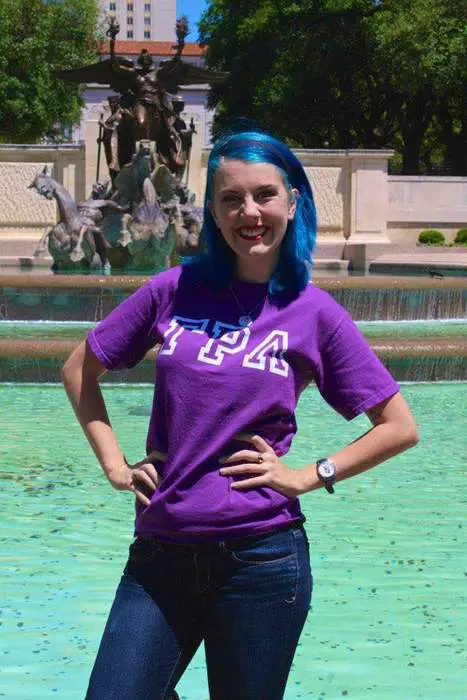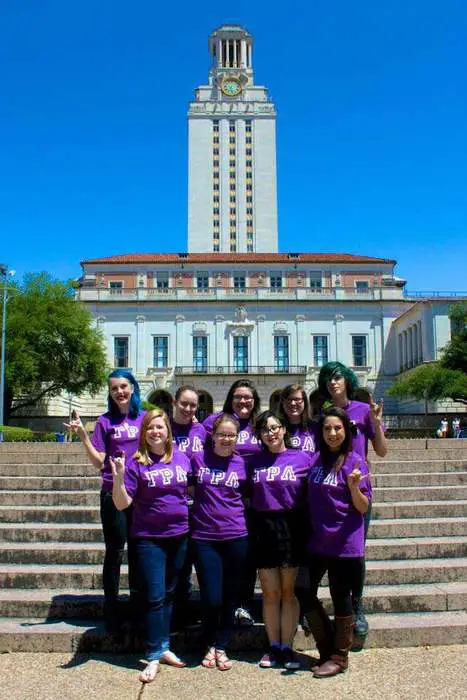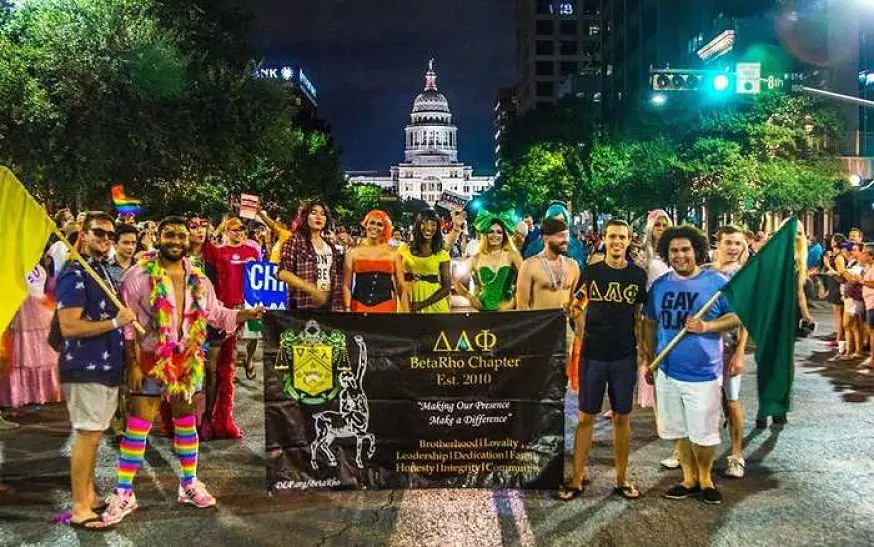On June 26, 2015, the Supreme Court legalized gay marriage throughout the country, a move acknowledging the growing national support for gay rights. According to the “Washington Post,” a record high 63 percent of Americans support gay marriage, and the number increases every year. Four all-female universities voted to update their acceptance criteria in early 2015, and now accept applications from anyone born female or identifying as female.
In pop culture, Laverne Cox became the first transgender person on the cover of “Time” magazine when she was included in the “Time” 100 Most Influential People List. When Caitlyn Jenner came out of the closet, she eclipsed the record held by President Obama for the fastest to one million Twitter followers. Finally, it appeared America had accepted the LGBTQ community.
Texas, however, remains one of the few state-led bastions of anti-gay legislation. In May, the House passed the “Pastor Protection” bill, designed to protect pastors and their churches when refusing to perform a same-sex marriage. The dust had barely settled on the Supreme Court announcement when Texas began combatting it.
Following the legalization of gay marriage, Lieutenant Governor Dan Patrick openly opposed the measure, taking immediate steps to ensure religious objectors would not be legally bound to violate their beliefs.
In support of his actions, Patrick referenced Proposition 2, the 2005 amendment defining marriage. “Nearly 75 percent of all Texans voted to place in our state Constitution, that, in Texas, marriage is defined as being between one man and one woman.” Like Stephen F. Austin at the Alamo, Patrick drew a line in the sand, pointing to the religious support buoying Texas’ anti-gay laws. “I would rather be on the wrong side of history than on the wrong side of my faith and beliefs.” Unlike Stephen F. Austin however, history will not celebrate Patrick’s obstinacy .
According to the Pew Research Center, more than 70 percent of millennials support same-sex marriage, a substantially higher number than other age groups and one that’s growing. “Millennial support for same-sex marriage has grown substantially over the past decade, from 51 percent in 2003 to 70 percent today,” the report found. In Texas, 44 percent of the population supports same-sex marriage, 41 percent oppose it and 14 percent are undecided.
These numbers are unprecedented. “The rise in support for same-sex marriage over the past decade is among the largest changes in opinion on any policy issue over this time period.” In other words, whether the Supreme Court legalized gay marriage in 2015 or in 2025, it was only a matter of time. The increasing support of younger generations makes expanding LGBTQ rights all but inevitable.
The momentum behind the LGBTQ movement may have made success seem inevitable, but that is an illusion. Tireless advocates of the LGBTQ community were pushing for their rights decades before the rainbow was a popular cause, and for these individuals the recent string of victories are only the first fruits to show after years of labor.
A fair share of catalysts for the LGBTQ movement have emerged from colleges, the perennial hotbed of ideological progressivism. Universities have always been the petri dishes of idealism—hospitable environments for fledgling ideas to grow. Two such groups at the University of Texas are making headway in their attempts to promote equality.
Gamma Rho Lambda (GRL), a queer focused and transgender-inclusive Greek society, and Delta Lambda Phi (DLP), a fraternity for gay, bisexual and progressive men, both strive to institute positive change by marrying the Greek archetype to LGBTQ sensibilities. The Greek community has suffered substantial criticism in the last year for accusations of racism and bigotry, some of which has been aimed at the queer community. Stories of homophobia within the Greek community pepper the Internet.
In March, the University of Texas chapter of the Phi Gamma Delta fraternity (Fiji) came under fire when a Reddit user posted a photo of confidential pledge rules, one of which read “NO FAGETRY [sic].” Though the majority of fraternity and sorority members disapprove of these backward concepts, the negative actions of a few people still sour the reputation of an entire organization. Stories of Greek homophobia pepper the Internet, making the proposition of LGBTQ people joining the Greek system highly unlikely. Instead of avoiding the Greek community system though, the members of GRL and DLP chose to use it as a medium for their message.
Lauren Ferguson, President and co-founder of Gamma Rho Lambda, believes that GRL encapsulates all the positive aspects of the fraternity and sorority system. “Greek life is really an awesome idea,” Ferguson said over the phone. “You get to do cool stuff with people you really care about.”

In fall 2014, she contacted the national branch of Gamma Rho Lambda about creating a chapter in Austin. Gamma Rho Lambda spans the country, with sixteen chapters and two colonies, one of which is the University of Texas branch. “Being a colony means we’re being monitored for three years,” Ferguson explained. “We have mostly the same rights as any other chapters, but they’re making sure we know what we’re doing while we set up.”
The following semester, Lauren and her sister Audrey began spreading word of the new organization, tabling and contacting gay organizations on campus. Those interested in joining underwent new member education and joined the sorority. Going into the semester, they officially have nine members, and plan to host their first recruitment Fall 2015. Ferguson never focused on recruitment for the sake of volume, but the sisters believe there’s going to be substantial growth in their first pledge class.
“Initially, we were just reaching out to see who was interested,” she says. “Over the last six months we found a lot people who are really interested, and we’re beginning to see there’s a big need for it on campus.” Ferguson plans on mimicking the activities of traditional sororities by creating recruitment traditions and hosting frequent social events. “We do Big & Little the first weekend after recruitment. We also do paddles, an initiation process and a new member education,” Ferguson says.
There are some differences, however. The aim of a queer sorority is to create a safe space for its members, so they plan on hosting low-stress events, such as ice cream socials and board game nights. “We just want to be meeting people who need us and who are a good fit for us,” Ferguson says. Since the keyword is safe space, the sorority avoids any activity that might dissuade potential new members. “We’re pretty much the same thing as a sorority, except we focus a little more on being inclusive.”
Gamma Rho Lambda welcomes all different races, sexual identities, gender identities and allies. But those are just guidelines: Ferguson stresses more than anything that if you identify as female, you’re welcome. “We have lesbian, transgender, bisexual and straight members,” she says. “It’s for everyone.”
Delta Lambda Phi is the male equivalent of GRL. A national queer fraternity, DLP bills itself as a social fraternity for gay, bisexual and progressive men. Vernon Strickland III founded DLP in 1987 in Washington D.C., and there are now thirty chapters, five colonies and one interest group. The Beta Rho Chapter was introduced to the University of Texas in September 2008 as a colony, and was chartered in fall 2010.
Andrew Beach, a senior and Microbiology major, recently joined the fraternity. Of the many different reasons to join a queer fraternity, discrimination in traditional fraternities is actually not the main reason guys join.
No fraternity explicitly forbids gay members from joining, and even Fiji’s alleged “No Fagetry” clause fails to prevent gay students from hiding their sexual identity and getting a bid. Beach said there are definitely gay men in fraternities, they just don’t tell their brothers. Even though most fraternities are officially non-discriminatory, many gay members choose to keep their sexuality a secret. “It would be OK for them to tell people,” Beach says,” but they’re afraid of it.”
The problem is that LGBTQ men aren’t looking to rush a fraternity where there is only a low level of discrimination—they want a fraternity with no level of discrimination. Even one fraternity brother who feels uncomfortable with a gay member can make the environment unsafe, and unfortunately it’s difficult to find genuine, universal acceptance in such masculinity-charged arenas. Most LGBTQ men want the same feeling community that straight men want, but feel like outsiders in traditional fraternities, spoiling the experience.
More importantly, all Greek groups focus on compatibility—do they fit? Queer fraternities bring together guys with similar backgrounds, senses of humor and interests, which often count for much more in terms of identity than sexual preference. “All the people in DLP are really fun people,” Beach says, “They’re my favorite kind of people.” Even if traditional fraternities were discrimination free, Greek life is more about friendships than shared sexual identity. “When we do things like community service,” says Beach, “It’s never like ‘This is so boring.’ I’m excited because I get to do whatever it is with my brothers.”
As a result, DLP has had incredible success by catering to an underserved demographic: LGBTQ college males who want a solid community of male friends. For Beach and many others, it’s a simple as that, but for some, the fraternity is a crucial resource. “A lot of the people I’ve talked to never had gay friends or have never had any sort of gay community,” Beach says. Similar to GRL, the fraternity operates on two levels: a safe place for anyone who needs it, as well as a social group based on friendship and shared interests.
The only connections that both queer chapters forbid are romantic ones. A non-issue with traditional fraternities and sororities, GRL and DLP both adhere to strict “hands-off” policies that limit the dating and hook-ups.
For GRL sisters, new members cannot date other new members, and active members are forbidden from dating new members. The sorority makes an exception for two members who join and are already dating, or when new members are dating someone outside the chapter. In DLP, the hands-off policy completely forbids dating and hook-ups except in the case of a preexisting relationship. Both Ferguson and Beach confessed that under the right circumstances, accommodations would most likely be made. The rules aim to keep the group focused on community, not stifle romance.
 In addition, GRL works hard to create a welcoming environment for members at all different comfort levels and stages of their sexual maturity. Even innocent flirting can backfire, and so their precautionary rules are well intentioned.
In addition, GRL works hard to create a welcoming environment for members at all different comfort levels and stages of their sexual maturity. Even innocent flirting can backfire, and so their precautionary rules are well intentioned.
Both groups err on the side of caution, as they are more prone to scrutiny than average Greek communities. Negative feedback can come for no reason, so they make extra efforts to avoid arming their detractors. For instance, underage drinking at many frat parties is practically a given, but GRL and DLP are much stricter about alcohol rules, making sure that if drinking does occur it’s unaffiliated with the groups.
While unfair, queer sororities and fraternities understand that they are on a pedestal. Discrimination against LGBTQ individuals already exists, so they work hard to avoid giving people reasons to discriminate against the groups as well. “I’ve seen [discrimination] against individual members,” Beach says, “but not just because their association with the fraternity.” Ferguson experienced some backlash when the news of her bringing GRL to campus surfaced, getting flyers handed back with reasons why the group should disband.
Still, the positive support has far outweighed the negative. “For every one person who doesn’t like us, there’s a thousand who support us. UT has been insanely supportive of us,” Ferguson said. “They not only willing to support us, but they’re excited about it.” Support has come in from across the country as the LGBTQ community has shown its solidarity. “People from across the nation who I don’t know were sending me and my sister messages saying, ‘Hey, this is awesome that you’re doing this. Keep it up.’”
Ferguson even found herself making strides within the LGBTQ community. “One woman from the Transgender Education Network of Texas was saying how important it was that we’re trans-inclusive,” says Ferguson, whose sister identifies as transsexual. “A lot of the feminism movements and LGBTQ community does not want to include trans-women into the queer spectrum because there is a lot of transphobia within [those communities],” Ferguson told the Daily Texan.
Ferguson and Beach acknowledge their groups’ first goal is to create spaces to hang out without worrying about discrimination. They want to have a network that functions the same way traditional Greek communities do—focusing on camaraderie, group identity and friendship.










